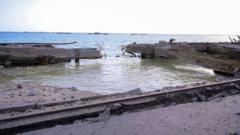Israel's military strikes on Houthi-controlled areas of Yemen mark a significant escalation in the ongoing conflict involving multiple actors, reflecting a complex interplay of regional tensions.
**Escalating Conflict: Israel Strikes Houthi Targets in Yemen Amid Rising Tensions**

**Escalating Conflict: Israel Strikes Houthi Targets in Yemen Amid Rising Tensions**
In response to Houthi attacks, Israel conducts air strikes on Yemen's main ports and a cargo ship previously hijacked by rebels.
The Israeli Defense Forces recently executed air strikes targeting Houthi-controlled ports and a cargo ship in Yemen, a response to a series of missile and drone attacks reportedly launched by the Iranian-backed group against Israel. Among the operations, Israeli jets struck the Red Sea ports of Hudaydah, Ras Issa, and al-Salif, as well as the cargo ship Galaxy Leader, which had been seized by the Houthis in November 2023 and allegedly used to surveil international shipping routes. The Israeli government accused the Houthis of utilizing these ports to facilitate the transfer of Iranian weaponry.
In a counter-response, the Houthis launched missiles towards Israel, triggering air raid sirens in the West Bank and southern Israel. Houthi leadership claimed their air defenses effectively thwarted the Israeli strikes while emphasizing their readiness for a prolonged confrontation, purportedly in support of the Palestinian cause. Reports indicate no immediate casualties resulting from the Israeli attacks.
Israeli military officials, including Defense Minister Israel Katz, firmly articulated their stance that the Houthi group will face severe repercussions for its actions against Israel. The military claimed to have deployed about 20 fighter jets for this operation, framing it as a necessary response following repeated aggressions from the Houthis, including drone intrusions into Israeli territory.
This flare-up occurs within the broader context of ongoing violence in the region, especially following the recent outbreak of hostilities between Israel and Hamas. Coinciding with these tensions, Houthi forces have been persistently targeting commercial vessels in the Red Sea, leading to enhanced security concerns for international shipping. Allegations of the Houthis sinking two vessels and seizing a third emphasize the scale of the maritime threat posed by the group in recent months.
A ceasefire agreement brokered by the U.S. in May 2025 had been intended to quell some violence in Yemen. However, the Houthis have clarified that this ceasefire does not preclude attacks on Israel, which further complicates the already tenuous situation.
In a related incident, the Liberian-flagged bulk carrier Magic Seas was reportedly attacked by Houthi forces while navigating south of Hudaydah, demonstrating the heightened risks for vessels in the region.
As this conflict unfolds, it underscores the intricate web of geopolitical interests, alliances, and the broader humanitarian crisis that continues to plague Yemen, where millions remain in need of assistance amid a long-running civil war.
In a counter-response, the Houthis launched missiles towards Israel, triggering air raid sirens in the West Bank and southern Israel. Houthi leadership claimed their air defenses effectively thwarted the Israeli strikes while emphasizing their readiness for a prolonged confrontation, purportedly in support of the Palestinian cause. Reports indicate no immediate casualties resulting from the Israeli attacks.
Israeli military officials, including Defense Minister Israel Katz, firmly articulated their stance that the Houthi group will face severe repercussions for its actions against Israel. The military claimed to have deployed about 20 fighter jets for this operation, framing it as a necessary response following repeated aggressions from the Houthis, including drone intrusions into Israeli territory.
This flare-up occurs within the broader context of ongoing violence in the region, especially following the recent outbreak of hostilities between Israel and Hamas. Coinciding with these tensions, Houthi forces have been persistently targeting commercial vessels in the Red Sea, leading to enhanced security concerns for international shipping. Allegations of the Houthis sinking two vessels and seizing a third emphasize the scale of the maritime threat posed by the group in recent months.
A ceasefire agreement brokered by the U.S. in May 2025 had been intended to quell some violence in Yemen. However, the Houthis have clarified that this ceasefire does not preclude attacks on Israel, which further complicates the already tenuous situation.
In a related incident, the Liberian-flagged bulk carrier Magic Seas was reportedly attacked by Houthi forces while navigating south of Hudaydah, demonstrating the heightened risks for vessels in the region.
As this conflict unfolds, it underscores the intricate web of geopolitical interests, alliances, and the broader humanitarian crisis that continues to plague Yemen, where millions remain in need of assistance amid a long-running civil war.



















